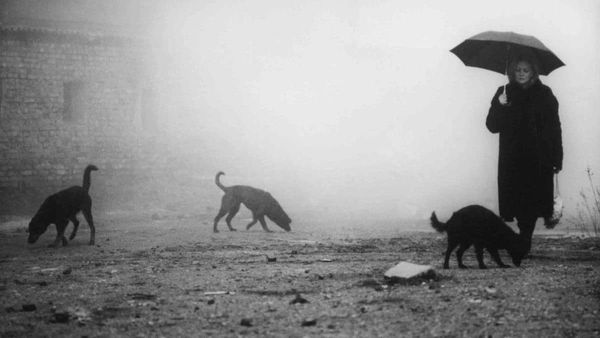Eye For Film >> Movies >> Damnation (1988) Film Review

In wide shot, buckets of coal move inexorably to and fro along an overhead cable, to the accompaniment of a constant industrial whirr. Slowly, slowly, the image pulls back to reveal that the view is in fact from a window, as a figure watches and smokes in silhouette. If this bleak black-and-white panorama is the purview of Karrer (Miklós B Széleky), a middle-aged man who has all but resigned himself to a life that will never go anywhere or achieve anything beyond repetitive drudgery and loveless oblivion, it is also unmistakably the apocalyptic view of filmmaker Béla Tarr, forming a bridge between his early experiments in gloomy realism, and his later commitment to drawn-out takes and grimly allegorical microcosms of the human condition.
Indeed, there is more than a slight resemblance between this opening sequence in Damnation, first released in 1988, and the opening of Tarr's The Man From London, made some two decades later – and what is more, both films build their existential explorations around the barest skeleton of a conventional noir plot.

Tarr has stated on record his belief that "one is making the same film all throughout one's life", but at least his particular vision is of a singularity and purity that precludes comparison with the work of any other director (except perhaps Andrei Tarkovsky). Not that the muddy, almost permanently rain-soaked small town depicted in Damnation is entirely without antecedents, blending the Middle-European claustrophobia of Franz Kafka with the mechanised monochrome landscapes of David Lynch's Eraserhead (1977).
The only thing still linking barfly Karrer to a life of hope is his obsessive attachment to a nightclub chanteuse (Vali Kerekes), whose elegiac songs chime perfectly with his own innermost feelings of melancholy. When she dumps him unceremoniously at the film's beginning, Karrer plots to buy himself another three days with her by passing on to her debt-ridden husband Sebestyén (György Cserhalmi) a smuggling job organised by bar landlord Willarsky (Gyula Pauer).
Too bad Karrer does not listen to the ominous warnings and Old Testament quotations offered him by an enigmatic cloakroom attendant (Hédi Temessy) from the appropriately named Titanic Bar. As Karrer himself puts it, "Stories end badly, stories are all stories of disintegration" – and Karrer's last desperate bid to revive his humanity is going to end on the rocks, much as he is about to go to the dogs.
Tarr has (rightly) earned a reputation as this generation's master of the brooding long take, and in Damnation he executes his slow tracking shots with a choreographed precision that makes the whole film resemble the dance in its prolonged climax. The drab decay, no less moral than material, of both Karrer and the town that he haunts is so beautifully composed that no cinephile will begrudge Tarr the occasional longueur - and coming in at just under two hours, Damnation is, in fact, considerably shorter than his more recent films (the duration of 1994's Sátántangó is a forbidding seven and a half hours). What does, however, risk stretching the patience here, far more than Tarr's deliberate sense of pacing, is the stylisation of a screenplay that sees the characters speaking in overstrained monologues.
Still, nobody subjects humanity to doom-laden fatalism quite like Tarr, and Damnation is unmissable for fans of the auteur's oeuvre, or of mud-spattered miserabilism in general.
Reviewed on: 13 May 2009

















